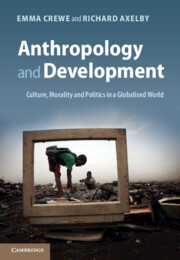Book contents
- Frontmatter
- Contents
- List of acronyms
- Preface and acknowledgements
- 1 Introduction
- 2 Anthropologists engaged
- 3 The social and political organisation of aid and development
- 4 The elusive poor
- 5 Human rights and cultural fantasies
- 6 Hierarchies of knowledge
- 7 The moralities of production and exchange
- 8 The politics of policy and practice
- 9 Imagining the future
- Appendix: challenging questions arising from this book
- Notes
- References
- Index
1 - Introduction
hope and despair
Published online by Cambridge University Press: 05 November 2012
- Frontmatter
- Contents
- List of acronyms
- Preface and acknowledgements
- 1 Introduction
- 2 Anthropologists engaged
- 3 The social and political organisation of aid and development
- 4 The elusive poor
- 5 Human rights and cultural fantasies
- 6 Hierarchies of knowledge
- 7 The moralities of production and exchange
- 8 The politics of policy and practice
- 9 Imagining the future
- Appendix: challenging questions arising from this book
- Notes
- References
- Index
Summary
The emotional geography of development spans the twin poles of hope and despair. Development is a powerfully affective world that touches us all. Despair at failure, corruption and enduring suffering sit alongside hope invested into how we imagine the future, but they are not the only responses. Guilt, anger, cynicism and piety all charge development encounters with emotion and morality.
Key points covered by this chapter
This chapter outlines different theoretical bases by which policy-makers, scholars and practitioners have sought to understand development.
We describe how ways of thinking about development influence practice.
We look at a number of points of similarity between globalised narratives and describe how these common assumptions may limit understanding of the complex reality of change.
We outline the basis of recent anthropological approaches to the study and practice of development.
Finally the main themes and the chapters of the book are introduced.
Viewed from the comfort of social and geographical distance, economically ‘poor countries’ are conjured up as places of unrelenting misery by the US and European media. They are beset by social breakdown and endemic corruption, where state failure results in endless cycles of civil conflict. Grinding poverty and senseless violence, ‘biblical’ famines, disasters and killer diseases are depicted. Poor, Third World or developing countries are populated by the starving, the destitute, the displaced and the marginalised. They live in unsanitary conditions, are unable to access clean water and lack adequate standards of healthcare. To make the subject of development ‘newsworthy’, the mainstream media tend to employ extreme and sensationalist images of suffering and despair. But such portrayals are not restricted to news reports. Fundraising drives and awareness-raising campaigns also rely on the evocation of despair to provoke a reaction. Shocking images are accompanied by passionate pleas for support.
- Type
- Chapter
- Information
- Anthropology and DevelopmentCulture, Morality and Politics in a Globalised World, pp. 1 - 26Publisher: Cambridge University PressPrint publication year: 2012
- 1
- Cited by



